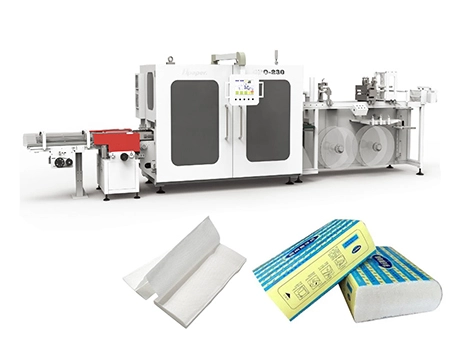PAPER TOWEL MAKING MACHINE

Termékleírás
PAPER TOWEL MAKING MACHINE
A paper towel making machine is an advanced manufacturing tool designed for the mass production of paper towels. It efficiently handles processes such as embossing, perforating, rolling, and cutting, ensuring consistent quality and size. This machine is indispensable for suppliers aiming to fulfill the growing demand for paper towels in households, restrooms, and commercial kitchens with high efficiency and productivity.
PAPER TOWEL MAKING MACHINE FOR SALE
Automatic Paper Towel Packing Machine OPO-230
The company's new self-developed technology, 10-axis servo motion control is suitable for automatic bagging of cotton towels, wipes, sanitary towels/cushions, etc.
UNDERSTANDING PAPER TOWEL MAKING MACHINERY
Understanding the intricacies of paper cotton towel making machine is essential for appreciating the efficiency and innovation behind the production of this everyday hygiene product. At its core, the process begins with preparing the paper pulp, which can be derived from either virgin or recycled paper. This pulp is then diluted with water and spread onto a wire mesh conveyor belt, where the water begins to drain, and the pulp starts to form a paper sheet.
The next critical step involves pressing and drying. Heavy rollers press the wet paper to remove as much water as possible, followed by the paper being dried using heated rollers or cylinders. This not only ensures the paper is dry but also contributes to its strength and texture. After drying, the paper sheet is embossed, a process that enhances the paper’s absorbency and provides it with a quilted pattern, which is characteristic of many paper towels.
The embossed paper is then wound onto large rolls, known as jumbo rolls, which are subsequently cut into smaller rolls of the desired width and size. This cutting process is precise, ensuring that each roll is uniform. The final step in the paper towel making process involves packaging the rolls for distribution and sale.
Modern paper towel making machines are highly automated, capable of producing thousands of rolls per day. They incorporate advanced technology to monitor quality, adjust parameters in real-time, and reduce waste, thereby ensuring efficiency and sustainability in paper towel production.
TEARING INTO THE FUTURE: AUTOMATED SOLUTIONS IN PAPER TOWEL MAKING
As we tear into the future, the paper towel industry is witnessing a significant transformation, driven by the advent of automated solutions in paper towel making. These technological advancements are not only enhancing production efficiency but also elevating the quality of the final product, meeting the ever-growing consumer demand for high-quality, eco-friendly paper towels.
Automated paper towel banane ki machines are at the heart of this revolution. Equipped with state-of-the-art technology, these machines streamline the entire production process, from pulp preparation to the final packaging. Advanced sensors and control systems ensure precise control over the thickness, texture, and absorbency of the paper towels, while also optimizing the use of raw materials and minimizing waste.
One of the key benefits of automation is the significant increase in production speed and volume. These tissue machines can operate 24/7, producing thousands of rolls per day, thus ensuring a constant supply to meet market demands. Moreover, automation reduces the need for manual labor, lowering the risk of human error and enhancing workplace safety.
Furthermore, automated solutions in paper towel making are paving the way for more sustainable production practices. By optimizing energy use and reducing waste, these machines contribute to a smaller environmental footprint, aligning with global efforts towards sustainability.

